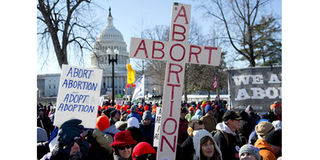Premium
Geneva deal puts lives of women at risk

Anti-abortion demonstrators protest in front of the US Supreme Court and US Capitol during the 41st annual March of Life in Washington, DC, January 22, 2014.
What you need to know:
- Our daily interaction with young girls is increasingly leaving us scared.
- Unsafe abortion is preventable but it remains a serious public health problem that is widely ignored.
Last year, Valerie*, a 15-year-old girl from the plantation areas in Kiambu, was raped by an older man. Scared of blame and without proper information about post-rape counselling and services, she told no one.
She later discovered that she was pregnant and approached a close friend for help. That friend referred her to a quack who terminated the pregnancy using a crude method, a herbal concoction. The bleeding never stopped and Valerie died.
In our sexual health programmes in Kiambu, we provide wellness trainings and have heard many stories similar to Valerie’s. These are the untold tales of suffering that many girls and women in Kenya go through. In fact, in Kenya seven women die daily from consequences of unsafe abortion.
Despite this alarming statistic, Kenya recently signed onto the Geneva Consensus Declaration at a virtual international meeting. This two-page document, drafted by the US, claims to “promote the rights of women and strengthen the family,” but in the same breath states that there is “no international right to abortion.”
Rights of women
This document goes directly against Kenyan law and violates the rights of women. We are youth champions who have been working on reproductive health matters for over 10 years.
Our daily interaction with young girls is increasingly leaving us scared. We are tired of seeing lives being lost every day due to unsafe abortion complications, which are preventable.
In Kenya a ministry of Health study estimates that more than 21,000 girls and women are hospitalised annually in public facilities due to abortion-related complications. Another study revealed in 2018 that the cost of treating unsafe abortion ranges from Sh433 to Sh533 million.
Unsafe abortion is preventable but it remains a serious public health problem that is widely ignored. Our Constitution guarantees women the right to the highest attainable standards of health, including reproductive health care services and emergency medical treatment under Article 43 (1) (a) and 43 (2).
Additionally, Article 26(4) gives provisions for termination of pregnancy “If in the opinion of a trained medical professional, there is need for emergency treatment, the life of the pregnant person is in danger and if permitted by any written law”.
Reproductive health
Signing the Geneva Consensus Declaration undermines the 2010 Constitution, international and regional frameworks that promote access to sexual and reproductive health and rights including the Convention on the Elimination of all forms of Discrimination Against Women and the Protocol to the African Charter on Human and People’s Rights on the Rights of Women in Africa (Maputo Protocol).
Interestingly, this declaration, signed by 16 African states as well as countries like Belarus, known for human rights violations, is designed by a country — the US — that allows safe abortion for its own women.
During last year’s International Conference on Population and Development Summit hosted by Kenya, which recognises reproductive health, empowerment of women and gender equality as pillars of sustainable development, President Uhuru Kenyatta promised to eliminate preventable maternal mortality.
Signing this foreign agreement means that girls and women will not access safe abortion services currently legal under Kenyan law, they will continue dying due to entirely preventable complications hence increasing maternal mortality and morbidity. Additionally, they will struggle to access post abortion care services which will put their lives at more risk.
As youth champions and the future of this country, we demand that Foreign Affairs Cabinet Secretary Raychelle Omamo, Principal Secretary Macharia Kamau and the team at the Ministry of Foreign Affairs, withdraw from this Declaration.
Our ambassadors should represent our national interests, health and security – and should respect the sovereignty of Kenyan law without compromise. We refuse to negotiate and trade off our lives and die from unsafe abortions.






